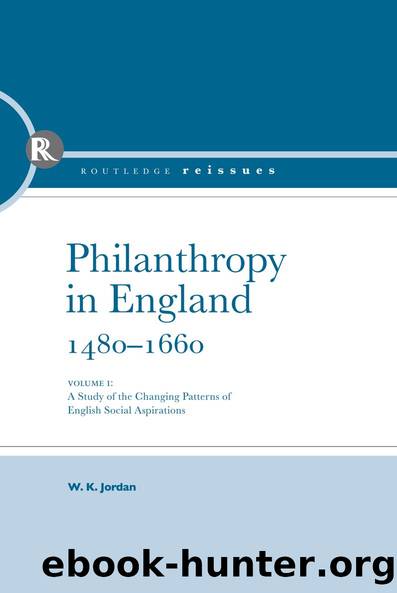Philanthropy in England, 1480 - 1660 by W. K. Jordan

Author:W. K. Jordan [Jordan, W. K.]
Language: eng
Format: epub
ISBN: 9781135656515
Barnesnoble:
Publisher: Taylor & Francis
Published: 2013-10-28T00:00:00+00:00
The Corporation in its report and appeal in the same year stated that it was lending complete sustenance and education to about one hundred poor children and was 'ayming at the entertainment of some hundreds more'. Many hundreds of poor families were being supported at useful labour, 'none being refused or denied imployment that will come for it'. None the less, it must be concluded that the Corporation added only slightly to the resources already in being for the care of the derelict and that its work remained somewhat uninspired and inconsequential. Its contribution had been fully made by the time of the restoration of the monarchy.
It seems quite certain that the establishment of the Corporation inspired a proposal in 1649 by Peter Chamberlen, a prominent London physician and a 'projector' par excellence, for a really heroic attempt to deal with the problem of poverty. The poor constitute a heavy drain on the national economy, and they simply must be provided for whether by a debit or a credit against national resources. Hence he suggests that a national stock, or corporation, be formed whose assets would consist of the remaining royal and episcopal estates, all common lands and marshes, abandoned mines, tithe assessments for a period of three years, after which they would be eliminated, and certain other national resources. This huge capital wealth, most of which was quite unexploited, would be employed for the advancement of education, colonization, and above all to provide fruitful labour for the poor of England. These resources would be used for the 'benefit of the whole nation, by improving of lands that were never improved, by imploying of men that were not onely useles; but a burthen, through idleness, or want of imployment, and by converting them into good common-wealths-men . . . for the honour . . . and . . . strength of the nation'.2 Chamberlen also advocated a public bank which he thought would revive trade, while he had every confidence that great national prosperity would at once result if the poor of the nation could be set on useful work.3 No better use could be made of the public resources of the nation, since 'all riches whatsoever proceed from the labour and Industrie of the poor ... the more poor, the more hands, the more work, the more wealth'.1 If such a plan, fired with boldness and imagination, were set in motion, within a few years England would discover that she had not a surplus but an acute shortage of labour.
Chamberlen's plan did possess great boldness, but it was of course sketched only in the broadest outlines and concealed by its warm enthusiasm the legal, the administrative, and the practical difficulties which would have been encountered in setting in motion even a segment of this grandiose proposal. But this kind of thinking was very much in the air during this period of revolution and swift change. Thus in the next year, 1650, an anonymous tract, almost certainly inaccurately attributed to
Download
This site does not store any files on its server. We only index and link to content provided by other sites. Please contact the content providers to delete copyright contents if any and email us, we'll remove relevant links or contents immediately.
Cecilia; Or, Memoirs of an Heiress — Volume 1 by Fanny Burney(32544)
Cecilia; Or, Memoirs of an Heiress — Volume 2 by Fanny Burney(31942)
Cecilia; Or, Memoirs of an Heiress — Volume 3 by Fanny Burney(31929)
The Great Music City by Andrea Baker(31916)
We're Going to Need More Wine by Gabrielle Union(19034)
All the Missing Girls by Megan Miranda(15946)
Pimp by Iceberg Slim(14484)
Bombshells: Glamour Girls of a Lifetime by Sullivan Steve(14052)
For the Love of Europe by Rick Steves(13904)
Talking to Strangers by Malcolm Gladwell(13346)
Norse Mythology by Gaiman Neil(13345)
Fifty Shades Freed by E L James(13232)
Mindhunter: Inside the FBI's Elite Serial Crime Unit by John E. Douglas & Mark Olshaker(9318)
Crazy Rich Asians by Kevin Kwan(9277)
The Lost Art of Listening by Michael P. Nichols(7490)
Enlightenment Now: The Case for Reason, Science, Humanism, and Progress by Steven Pinker(7306)
The Four Agreements by Don Miguel Ruiz(6744)
Bad Blood by John Carreyrou(6611)
Weapons of Math Destruction by Cathy O'Neil(6264)
